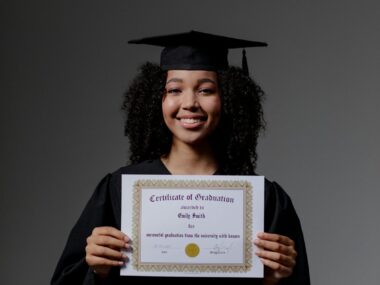Introducing Marshall Scholarship
The Marshall Scholarship is one of the most prestigious and competitive scholarships available to American students seeking to pursue graduate studies in the United Kingdom. Established by the British government in 1953, the scholarship was named in honor of U.S. Secretary of State George C. Marshall and aims to strengthen the enduring relationship between the United Kingdom and the United States. This article provides a comprehensive overview of recent news related to the Marshall Scholarship, its history, application process, benefits, and its impact on the lives of recipients and international relations.
History and Purpose of the Marshall Scholarship
Origin and Development
The Marshall Scholarship was created as a gesture of gratitude to the United States for the aid provided under the Marshall Plan after World War II. The scholarship was intended to commemorate the contributions of George C. Marshall and to solidify the special relationship between the two nations. Since its inception, the program has supported over 2,000 scholars, providing them with the opportunity to study at any university in the United Kingdom.
Objectives of the Scholarship
The primary objectives of the Marshall Scholarship are to:
1.Strengthen U.S.-UK Relations: Foster mutual understanding and collaboration between future leaders of both countries.
2.Promote Academic Excellence: Support outstanding American students in their pursuit of graduate education.
3.Encourage Personal Growth: Provide scholars with opportunities for cultural exchange and personal development.
4.Foster Leadership: Cultivate a network of leaders who can contribute positively to society.
Recent News and Developments
Changes in Selection Criteria
In recent years, there have been significant changes in the selection criteria for the Marshall Scholarship. These changes aim to increase diversity and ensure that a broader range of applicants can benefit from the program. The selection committees now place a greater emphasis on leadership potential, public service, and the ability to act as a cultural ambassador. Academic excellence remains a crucial criterion, but the holistic review process ensures that other qualities are also considered.
Increased Funding and Opportunities
The British government and private donors have committed additional funding to the Marshall Scholarship program. This increased financial support has allowed the program to expand the number of scholarships awarded annually and to offer more comprehensive financial packages to recipients. The enhanced funding covers tuition, living expenses, travel costs, and additional allowances for books and research.
New Partnerships with Universities
The Marshall Scholarship program has recently established new partnerships with several leading universities in the United Kingdom. These partnerships aim to provide scholars with access to a broader range of academic programs and resources. The participating universities offer specialized support and mentorship to Marshall Scholars, enhancing their academic and professional development.
Alumni Achievements and Contributions
Marshall Scholars continue to make significant contributions in various fields, including academia, public service, business, and the arts. Recent alumni achievements highlight the impact of the scholarship on their careers and personal lives. Scholars have gone on to hold prominent positions in government, academia, and industry, demonstrating the program’s success in fostering leadership and excellence.
Application Process
Eligibility Requirements
To be eligible for the Marshall Scholarship, applicants must meet the following criteria:
Citizenship: Applicants must be citizens of the United States at the time of application.
Academic Achievement: Applicants must have a minimum GPA of 3.7 on a 4.0 scale.
Degree Completion: Applicants must have obtained their undergraduate degree within the last three years before applying.
Endorsement: Applicants must be endorsed by their undergraduate institution.
Application Components
The application process for the Marshall Scholarship is rigorous and involves several components:
1.Application Form: The form requires personal information, academic history, and details about the applicant’s proposed course of study in the UK.
2.Personal Statement: A personal essay outlining the applicant’s academic and career goals, and how the Marshall Scholarship will help achieve these objectives.
3.Study Proposal: A detailed proposal of the academic program the applicant wishes to pursue in the UK, including the reasons for choosing the specific university and course.
4.Letters of Recommendation: Applicants must submit four letters of recommendation from professors or professionals who can attest to their qualifications and potential.
5.Endorsement Letter: An endorsement letter from the applicant’s undergraduate institution, supporting their candidacy.
Selection Process
The selection process for the Marshall Scholarship is highly competitive. It involves multiple stages, including:
1.Regional Selection Committees: Initial screening and interviews are conducted by regional committees across the United States.
2.National Selection Committee: Final selection is made by a national committee based on the recommendations of the regional committees.
3.Interviews: Shortlisted candidates are invited for interviews, where they are assessed on their academic achievements, leadership potential, and ability to act as cultural ambassadors.
Benefits of the Marshall Scholarship
Financial Support
The Marshall Scholarship provides comprehensive financial support to cover all aspects of the scholars’ studies in the UK. This includes:
1.Tuition Fees: Full coverage of tuition fees at any UK university.
2.Living Expenses: A generous stipend to cover living costs, including accommodation, food, and personal expenses.
3.Travel Allowance: Funds to cover travel expenses between the United States and the UK.
4.Additional Allowances: Extra funding for books, research, and other academic-related expenses.
Academic and Professional Development
Marshall Scholars benefit from the opportunity to study at some of the most prestigious universities in the UK. They have access to world-class academic resources, research facilities, and mentorship from leading scholars in their fields. The scholarship also offers professional development opportunities, including internships, conferences, and networking events.
Cultural Exchange and Personal Growth
One of the unique aspects of the Marshall Scholarship is its emphasis on cultural exchange. Scholars immerse themselves in British culture, forging connections with their peers and gaining a deeper understanding of the UK. This experience fosters personal growth, broadens perspectives, and enhances intercultural competence.
Networking Opportunities
Marshall Scholars join an exclusive network of alumni who have gone on to achieve remarkable success in various fields. The Marshall Alumni Association provides ongoing support and networking opportunities, allowing scholars to connect with influential leaders and leverage their connections for career advancement.
Impact on Scholars and Society
Alumni Success Stories
Marshall Scholars have made significant contributions in a wide range of fields. Notable alumni include:
Anne Applebaum: Pulitzer Prize-winning journalist and historian.
Reed Hastings: Co-founder and CEO of Netflix.
Roger Tsien: Nobel Prize-winning chemist.
Raymond Gilmartin: Former CEO of Merck & Co.
These success stories highlight the transformative impact of the Marshall Scholarship on the careers and lives of its recipients.
Contributions to U.S.-UK Relations
Marshall Scholars play a crucial role in strengthening U.S.-UK relations. As cultural ambassadors, they foster mutual understanding and collaboration between the two countries. Many scholars remain engaged with the UK throughout their careers, contributing to bilateral initiatives and partnerships.
Advancements in Research and Innovation
Marshall Scholars are often at the forefront of research and innovation. Their work has led to significant advancements in various fields, from medical research to technology and social sciences. The scholarship supports scholars’ research endeavors, enabling them to contribute to the global knowledge base.
Public Service and Leadership
Many Marshall Scholars pursue careers in public service, leveraging their education and experiences to make a positive impact on society. They hold prominent positions in government, non-profit organizations, and international institutions, demonstrating the scholarship’s success in fostering leadership and civic engagement.
Challenges and Considerations
Maintaining the Prestige of the Scholarship
One of the ongoing challenges for the Marshall Scholarship program is maintaining its prestige and relevance in a changing educational landscape. This involves continuously updating the selection criteria, enhancing the support provided to scholars, and fostering strong relationships with partner universities.
Balancing Diversity and Excellence
The Marshall Scholarship program strives to balance diversity and academic excellence in its selection process. This involves ensuring that scholars come from a wide range of backgrounds and disciplines while maintaining the high standards of academic and leadership potential.
Adapting to Changing Educational Trends
The evolving landscape of higher education presents both challenges and opportunities for the Marshall Scholarship program. Adapting to new trends, such as the increasing emphasis on interdisciplinary studies and the rise of digital learning platforms, is crucial for the program’s continued success.
Supporting Scholars’ Well-being
Ensuring the well-being of Marshall Scholars during their time in the UK is a priority for the program. This includes providing adequate financial support, mental health resources, and academic advising to help scholars navigate the challenges of studying abroad.
Future Directions and Opportunities
Expanding the Program
There are opportunities to expand the Marshall Scholarship program by increasing the number of scholarships awarded each year and establishing new partnerships with UK universities. This expansion could provide more students with the opportunity to benefit from the program and strengthen the impact of the scholarship.
Enhancing Alumni Engagement
Strengthening the engagement of Marshall alumni is a key focus for the future. This involves creating more opportunities for alumni to connect, collaborate, and contribute to the scholarship program. Enhanced alumni engagement can provide valuable mentorship and support for current scholars.
Fostering Innovation and Interdisciplinary Studies
Encouraging innovation and interdisciplinary studies is an important direction for the Marshall Scholarship program. By supporting scholars who are engaged in cutting-edge research and collaborative projects, the program can contribute to addressing complex global challenges.
Promoting Global Citizenship
The Marshall Scholarship program has the potential to promote global citizenship by fostering intercultural competence and a commitment to international cooperation. Scholars can play a key role in addressing global issues, such as climate change, public health, and social justice.
Conclusion
The Marshall Scholarship remains one of the most prestigious and impactful scholarship programs available to American students. Its history, objectives, and recent developments highlight its significance in promoting academic excellence, cultural exchange, and international collaboration. The comprehensive financial support, academic and professional development opportunities, and the emphasis on leadership and public service make the Marshall Scholarship a transformative experience for its recipients.
As the program continues to evolve, it faces






